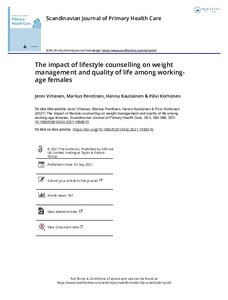The impact of lifestyle counselling on weight management and quality of life among working-age females
Penttinen Markus; Kautiainen Hannu; Korhonen Päivi; Virtanen Jenni
https://urn.fi/URN:NBN:fi-fe2021100750341
Tiivistelmä
Objective: Overweight and obesity are increasing globally. General practitioners (GP's) are at the first point of contact for medical support and consequently have a major role in resolving this overwhelming problem. The aim of this study was to assess the effectiveness of a brief lifestyle counselling on weight management and on the participants' quality of life (QoL).
Design: A cohort study with a one-year follow-up.
Setting: Occupational health care, city of Pori in southwestern Finland.
Participants: Female municipal employees (n = 625) with a mean age of 48 (SD 9) years.
Intervention: A nurse and a physiotherapist gave lifestyle counselling to all the participants; however, only the overweight/obese subjects were recommended to lose at least 5% of their initial weight.
Main outcome measure: Success in weight management and quality of life.
Results: At the follow-up visit, 10.4% (95% CI: 7.5-14.0) of the overweight/obese subjects had lost at least 5% of their weight, but 10.0% (95% CI: 6.7-14.3) of the normal-weight participants had become overweight. The mean weight change was +0.1 kg (95% CI: -0.3-0.5) in the overweight/obese group and +0.5 kg (95% CI: 0.2-0.8) in the normal weight group. The change in QoL was inversely correlated with relative weight change in overweight/obese subjects, albeit the effect size was small.
Conclusion: Weight management counselling should also be directed to individuals with a normal weight. Even with brief lifestyle counselling it may be possible to stabilize weight gain. Successful weight loss may improve the QoL of overweight/obese individuals.KEY POINTSPrimary health care has to deal with the increasing problem of overweight and obesity.Brief lifestyle counselling performed by a nurse and a physiotherapist seems to be quite effective in weight stabilization, considering the effort needed.People with normal weight tend to gain weight and weight management counselling should also be directed to them. Successful weight management may improve the quality of life of overweight/obese people.
Kokoelmat
- Rinnakkaistallenteet [19207]
